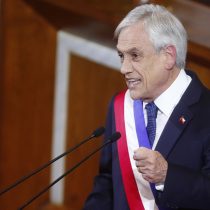
In his Public Account the President announced an investment plan in physical, social and digital infrastructure, with priority in housing construction. Resources will also be allocated to hospitals and offices, educational establishments, public transport, sports and cultural parks and centres, national and international digital networks, regional and communal investments for urban and neighborhood improvement.
While these investments are focused on job creation and the revival of the economy, they cannot think separately of three problems and challenges that our society (and the world) are facing today.
First, the environmental crisis, which forces us to incorporate sustainability criteria into everything we do. In particular, when thinking about urban investments, it is important to consider how they can contribute to the more efficient use of energy, promote circular and proximity economies, among others.
Second, the crisis of democratic representation and the challenge complement it with mechanisms of participatory democracy. Here is important how investments are decided, controlled and evaluated. It is very different to build a park without a participatory process than with it. Doing so with community participation involves incorporating collective intelligence that is neither in the authorities nor technically. This generates a project not only effective, but also legitimate and socially valued.
Third, inequality and the challenge of investments being planned by incorporating the criterion of territorial justice, that is, considering that resources contribute to improving balance in the way in which goods, services, equipment and decision-making power are distributed in the territory, so that the inhabitants can live their daily lives and decide on it.
Chile’s socio-economic inequalities are evident in space, producing and reproducing sharp differences and dynamics of subordination between territories at different scales: regions with respect to metropolitan areas, especially Santiago; local-rural areas with respect to regional and provincial capitals; finally, at the neighborhood level, certain sectors are disadvantaged compared to urban centres or areas with greater investment and purchasing power.
All of the above can be summed up in the challenge of creating common well-being: that every weight invested and that every decision made, contribute to generating a better life for all. Those of us who live today and those who will live tomorrow.
Incorporating the criteria of environmental sustainability, democratic governance and territorial justice into economic revival plans may involve, for some, over-complexing a task that must be swift. This argument has been repeatedly made and the facts always end up debunking it.
An emblematic case was the 2010 post-delay reconstruction process. After hundreds of cities, a huge amount of public and private infrastructure and more than three hundred thousand homes were damaged, “we had to act fast.” True, the bridges were replenished, the cities and housing were built, but in many cases we have something worse than there was. Let’s think about Talca’s case. The earthquake and subsequent demolitions left about 50 hectares empty in the city centre. Reconstruction was done without criteria of sustainability, democratic governance or territorial justice. What do we get? Ten years after the earthquake we have the same 50 hectares vacant, and instead a city that expanded its urban radius of 3,000 to 9 thousand hectares, which has generated vehicle congestion problems that the city has never seen before. The city, as common, lost.
Another example. The plan involves a series of public investments in infrastructure that, among other things, would involve making 47,000 housing solutions. Chilean housing policies from the dictatorship to the present day have been governed by the principle of subsidiarity of the State, that is, the State (we and us) gives money – “voucher” or a “voucher” – to families to finance part or completely a housing solution. These families, in turn, are obliged to deliver this “vale for” to real estate companies that, inserted in the business of building homes will try – in all logic – to build as cheaply as possible to achieve greater profitability, that is, far away (cheaper soils), with limited or simply bad construction quality (square meters and materialities), among other aspects.
This logic explains, for example, that many of the inhabitants of our country have to spend a lot of time moving to their jobs or that they cannot rest adequately because of the poor quality of the buildings. Decent life is played in such everyday situations, so any post-pandemia recovery plan should question the principles that govern our day-to-day life.
The argument of immediacy was hunger yesterday, it is hunger today and it will be hunger for tomorrow, for it is the pretext that allows us to perpetuate a way of doing the things that it has not generated or generate the dignified living conditions that we as Chileans and Chileans deserve.
Every weight invested by the state, and every private investment that needs to be regulated, must have criteria that transform them into better territories, better cities and better neighborhoods. The new urban development policy points in that direction and is a good charter for the resources to be invested for reactivation to have a positive effect, not only on employment but also on life itself. But this policy is not enough. New standards are required for everything we do as a society.
The content poured into this opinion column is the sole responsibility of its author, and does not necessarily reflect the editorial line or position of El Mostrador.
"El reclamo puede ser genuino, pero construido sobre una mentira", apuntó el presidente Javier Milei…
El gobernador de la provincia de Buenos Aires, Axel Kicillof, encabezó un acto en Ensenada…
El diputado nacional de La Libertad Avanza, José Luis Espert, expresó su confianza en la…
Tras la masiva reaparición de Cristina Fernández de Kirchner, el presidente Javier Milei apuntó contra…
El principal propósito de la nueva comisión es evaluar los recursos humanos en el Senado,…
En una medida que busca redefinir las condiciones de los seguros de automóviles en Argentina,…
Esta web usa cookies.